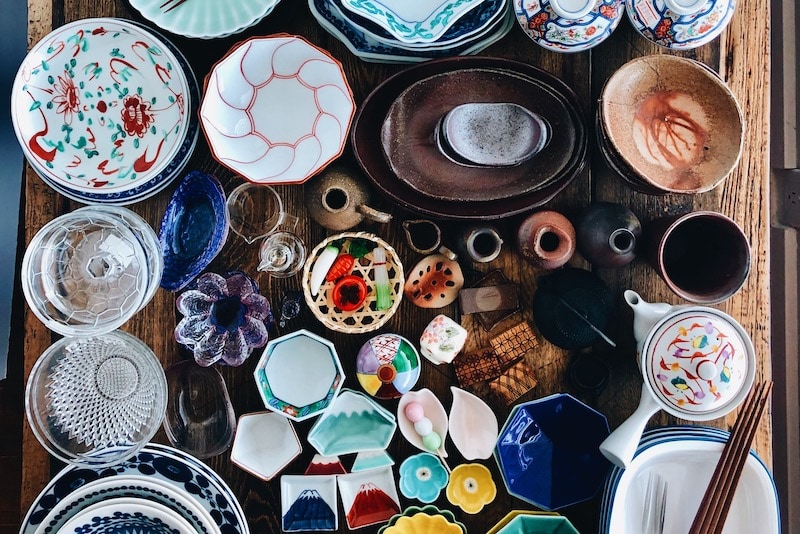
Not sure what cookware and tableware you should check out while visiting Japan? Here are 10 things that are worth bringing back in your suitcase from Japan.
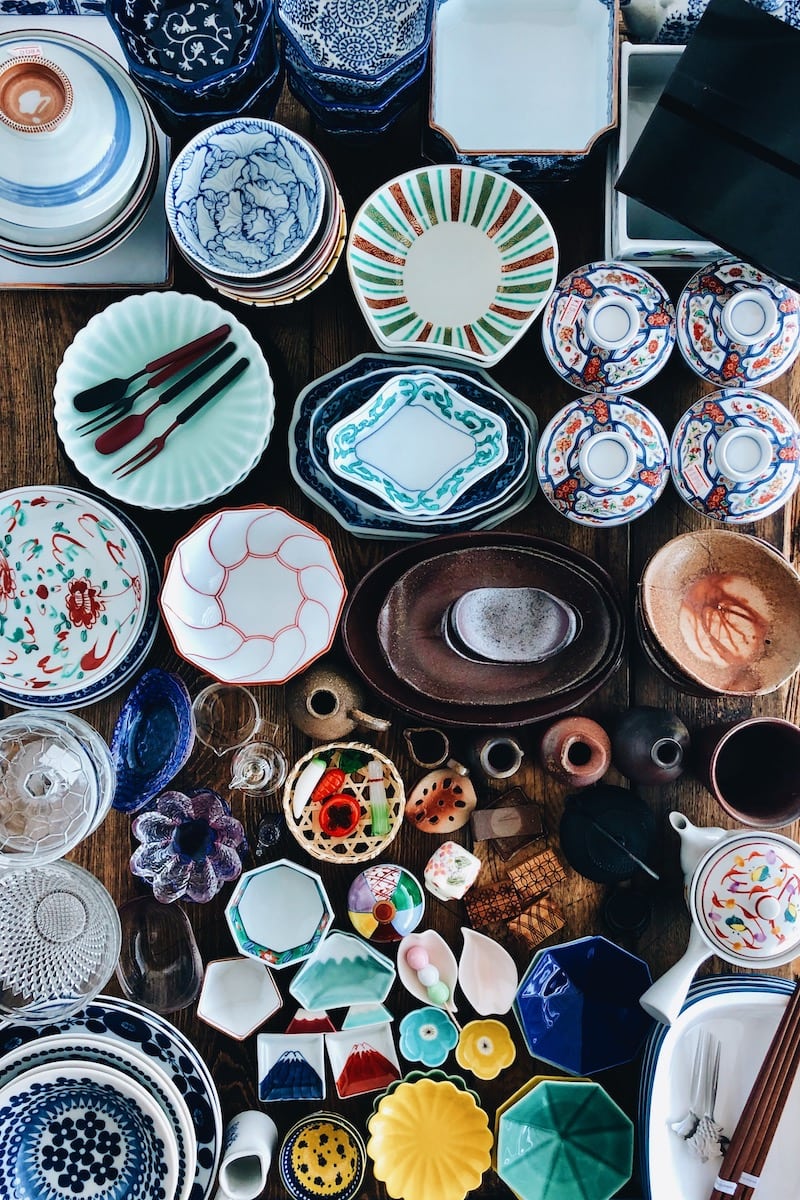
One of the most frequently asked questions I receive from JOC readers is what cookware and tableware they should buy when they visit Japan. With limited suitcase space, I understand I can’t suggest everything. Living in the U.S., I have trouble finding certain Japanese cookware and tableware from local stores or online stores, so I made a recommended list here for you.
My suggestions are really for someone who enjoys cooking Japanese food frequently and appreciates Japanese household items (if that’s not you, these also make great gift ideas for that person in your life who loves Japanese culture and cuisine!). If you’re lucky, you may be able to purchase these items easily where you are, but generally, these items are pretty difficult to find and can be very expensive compared to the price you pay while you’re in Japan.
Thank goodness my kids’ clothes are not giant yet, so I could lease some of their suitcase space for these items (and let them carry it for me)! I hope you find the list helpful and insightful.
1. Adjustable Stainless Steel Otoshibuta (Drop Lid) 落とし蓋
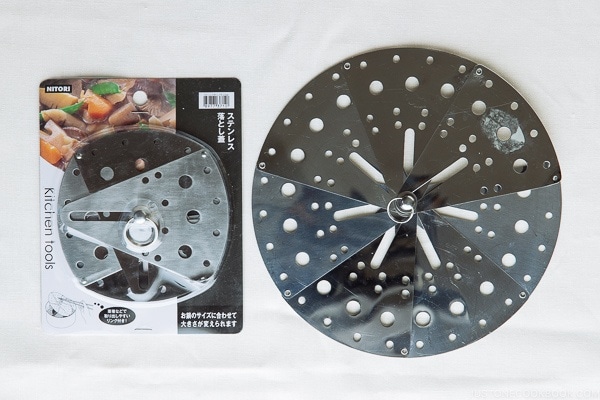
Otoshibuta or drop lid is an essential Japanese cooking gadget for all kinds of simmered foods. It’s a kitchen tool that is not so common outside of Japanese cooking, hence it’s hard to find it in kitchen shops in the U.S.
For the longest time, I’ve been waiting for someone or some company to sell these adjustable stainless steel otoshibuta on Amazon, but no luck yet. MTC Kitchen sells it for $19, but you can find an otoshibuta for less than $10 in Japan. This particular one above is around ¥800 ($8). So grab one (or two for your Japanese cooking buddy) when you visit Japan!
2. Tamagoyaki Pan 玉子焼きフライパン
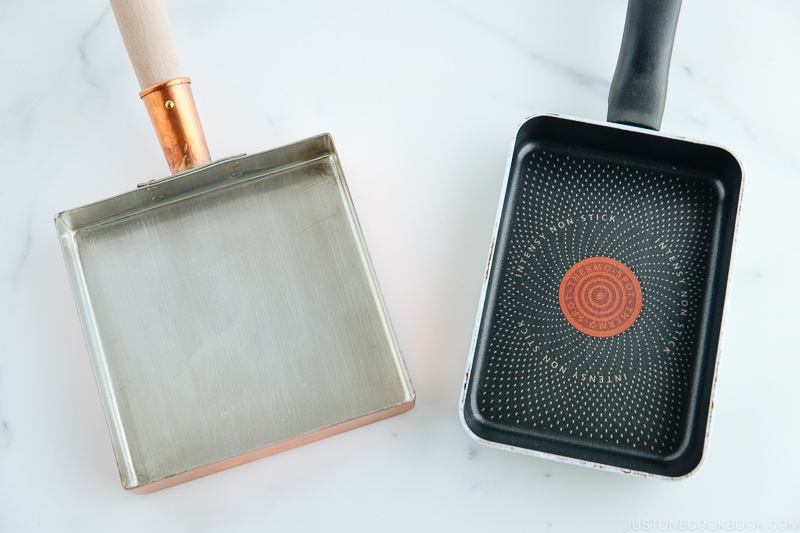
Yes, there are some non-stick Tamagoyaki pans such as this copper Tamagoyaki pan available on Amazon. But the quality of some pans I purchased before was not very good. If you do make tamagoyaki for your children’s bento or for your breakfast regularly, you might as well stop by a kitchen store and get one while visiting Japan. Here you can find my favorite T-fal brand in the picture below (top left) at Tokyu Hands in Shibuya store.
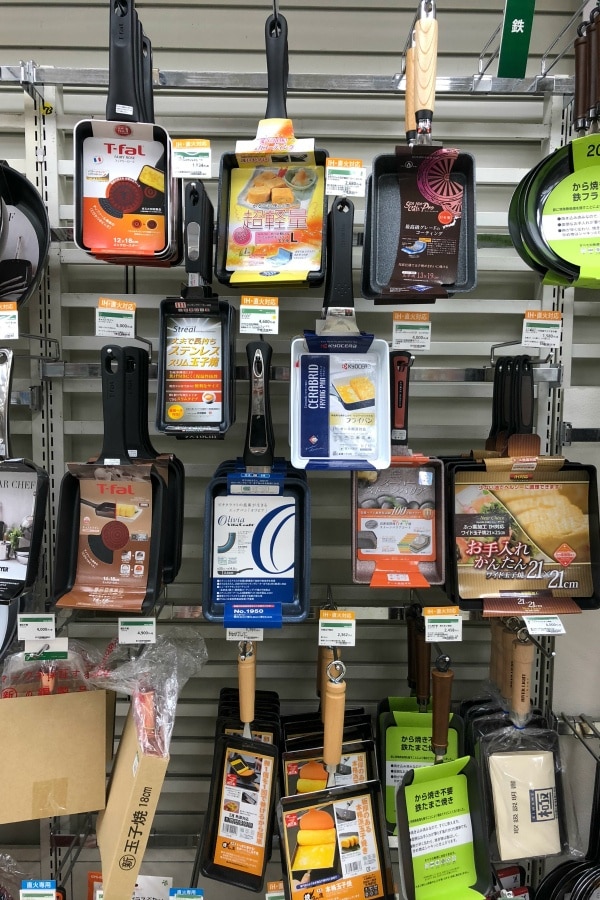
See all the choices of brands and sizes? These are much better quality and less expensive compared to ones you can find on Amazon.
3. Ladles お玉
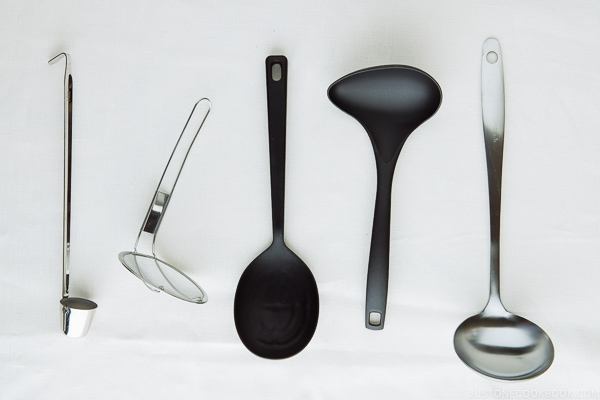
You may think I’m silly for listing a ladle on your Japan shop list. But true story… I had a really hard time finding the perfect ladle for serving miso soup. All the ladles I purchased in the U.S. are a bit too big to serve into standard size miso soup bowls. I may sound picky, but I’ve purchased enough ladles to try and all the ladles that I end up keeping are all from Japan. Let me say this, the size, shape, angle of the stem, and the material of these ladles from Japan are just perfect. I rest my case.
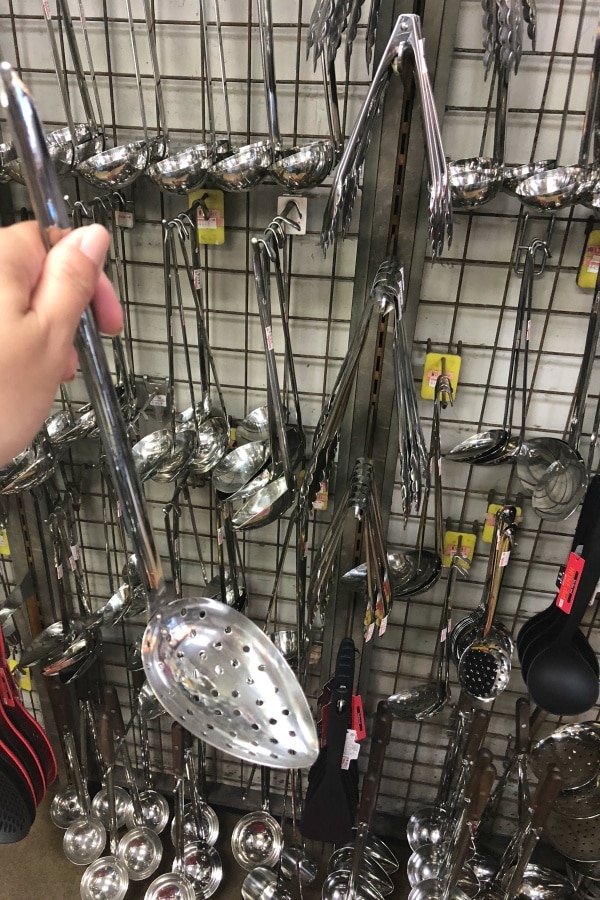
Here I took the picture at Kappabashi Kitchen Town. So many different sizes, shapes, and utility of ladles! I also recommend visiting supermarkets (especially the one that has a 2nd floor for home and kitchen goods), Tokyu Hands, and even department store kitchen floor. Try holding the ladles and see the difference!
4. Rice Bowls & Miso Soup Bowls お茶碗・お味噌汁椀
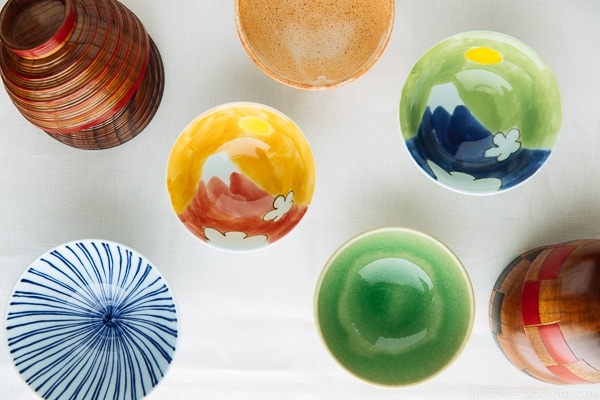
Rice bowls and miso soup bowls are something that we use daily for Japanese families. We have MANY, many variations of rice bowls and miso soup bowls in Japan. High-quality wooden miso soup bowls that are made in Japan are hard to find in the US. While you’re traveling in Japan, grab some wooden bowls. They are light, easy to bring back, and make your daily miso soup more fun and elegant!
I bought these rice bowls with Mount Fuji drawings that come with assorted colors. They bring a smile to my children and me every day. Find the one that makes you smile whether the bowl has a cute cat drawing or beautiful cherry blossoms, or it might be the right color that attracts you.
5. Bamboo Baskets
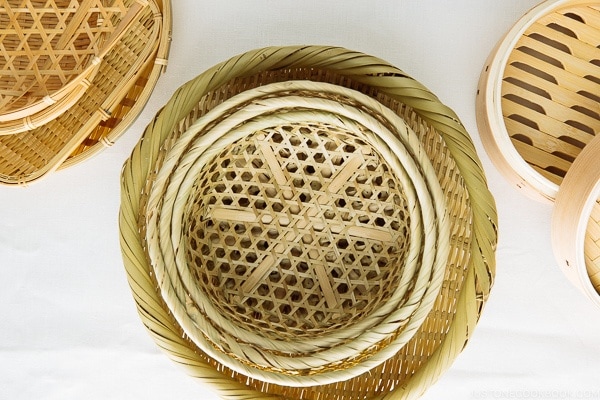
Bamboo products are so much easier to find in Asia. Japan offers amazing hand-woven bamboo products that are made in Japan. There are a lot of bamboo specialized stores and you might spot them while traveling, especially when you visit Kyoto, Takayama, Kamakura, and more traditional cities.
6. Ramen Bowls
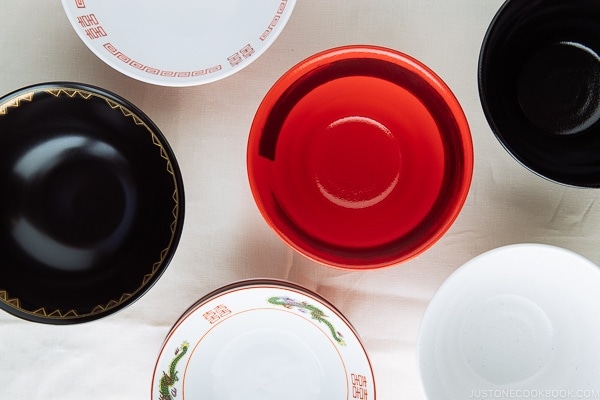
Unlike donburi (rice bowl dish) bowls that rims go straight up, ramen bowls have a wide opening on the top with rim going outward. This is especially helpful when your ramen has lots of toppings.
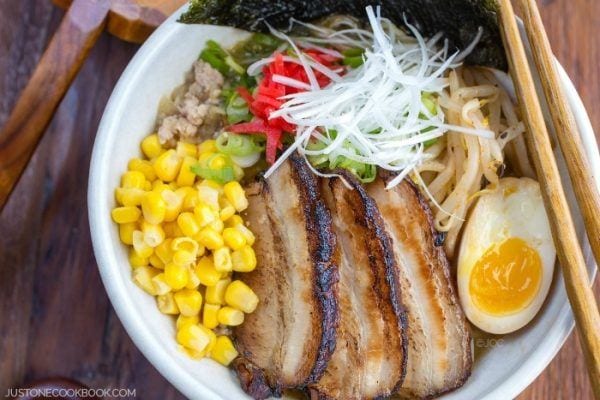
See the picture above? My ramen in a donburi bowl look very clustered, but when you serve the noodles in the ramen bowl, the ingredients have room to present themselves.
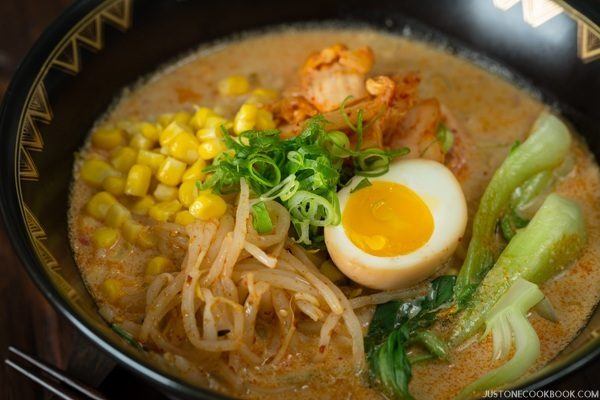
And, you can actually see the soup! So, if you’re a huge ramen fan, do get some ramen bowls when you’re in Japan. Good quality and good looking ramen bowls are so hard to get in the U.S. I got mine at Kappabashi Kitchen Town.
On the other hand, if you love donburi dishes, do get a variety of donburi bowls. Donburi is very common meal in Japan, hence we have SO MANY kinds of beautiful donburi bowls.
7. Chopsticks & Chopstick Rests
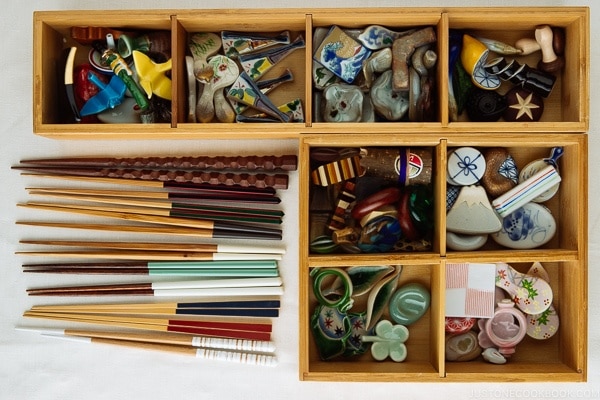
Even years before I started photo shooting my recipes, I’ve been a collector of chopstick rests. Something about them that is so attractive. Maybe because they are small and I love everything miniature.
If you are in Japan, you will see a lot of cute stores that sell kitchen and home goods. I love to stop by to check out some unique chopstick rests and chopsticks whenever I get a chance. Instead of buying a set of 4-5 pairs, I only buy one chopstick rest and a pair of chopsticks that I love from each store. I enjoy picking out which chopsticks and chopstick rests that would go well together, and everyone would have a different set. The mismatch is supposed to be fun!
8. Magewappa Bento Box
Bento (lunch box) is not only for children, adults can also enjoy it at school, work, or even at home. These wooden bento boxes, called the Magewappa (曲げわっぱ), not only is environmentally friendly, but they also make your lunches so much more appetizing and presentable.
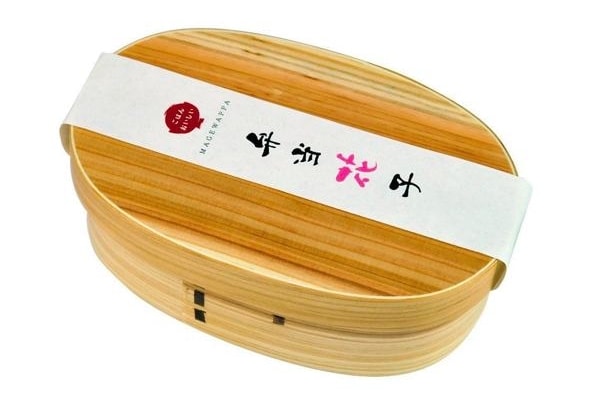
It’s a lot more inexpensive to buy bento boxes in Japan than trying to buy online. You can purchase Magewappa at any tableware and bento stores, but it’s a lot easier to go to Tokyu Hands or a bento box section of the kitchen floor in department stores.
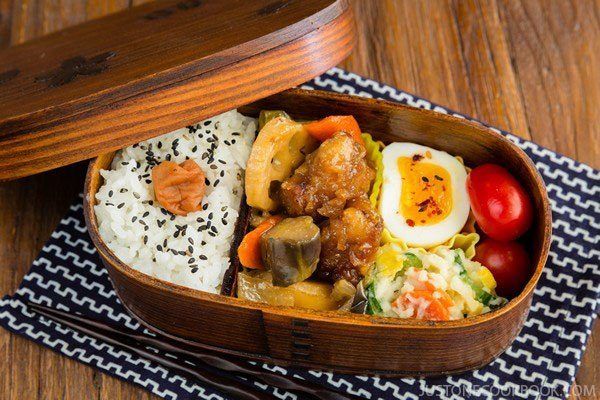
I forgot to mention. Bento box for adult is also great for portion control and perfect for those who try to lose some weight (aka me…).
9. Chiffon Cake Pans
I love baking chiffon cakes, so several years ago I bought two different cake pans (17cm and 20cm) in Japan and brought them home with me. Japanese chiffon cake pans are affordable and SUPER easy to use. I like that they come with a slim and tall shape, which are great when comes to making beautiful looking chiffon cakes compared to a flatter angel food cake pan.
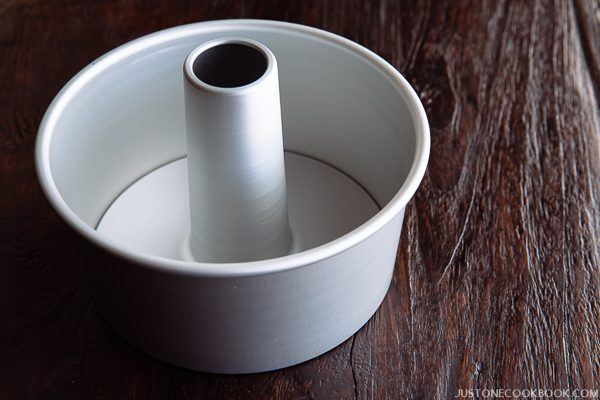
This aluminum chiffon cake pan from Asai Shoten (浅井商店) is VERY famous and you can go to the store in Kappabashi Kitchen Town to find them.
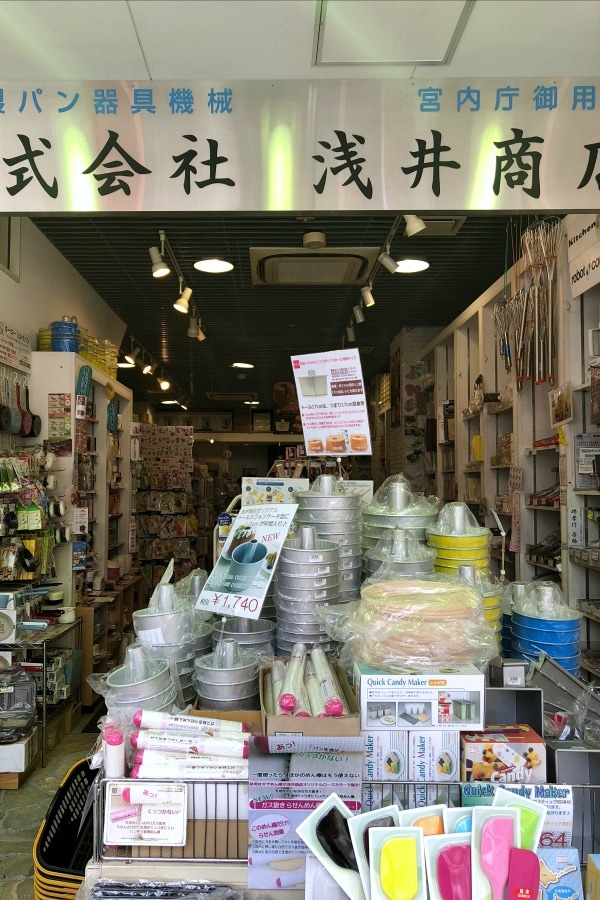
With these pans, you can make my Meyer Lemon Chiffon Cake, Green Tea Chiffon Cake, Orange Chiffon Cake, and Earl Grey Chiffon Cake.
10. Plates & Bowls
Some people enjoy shopping for clothes and shoes, but I enjoy getting new kitchen gadgets, pots and pans, and my endless love – plates and bowls. I especially love ceramics from Japan that are so delicate, unique, and of course, handmade.
Some of the plates and bowls are from my grandmother, so they are sentimental pieces to me. My mom kept them in boxes for me knowing that I would need these for Just One Cookbook. I am just happy that I can continue to use this special heirloom tableware.
If you’re curious about how I pack and bring them back home, you can see my Instagram Stories titled “Packing” in my profile, where I explained some tips on wrapping the ceramics and packing them in the boxes.
The picture below – Things I brought back in 2019: This year we got to visit and shop in Imari, Arita and Imbe (Bizenware).

The picture below – Things I brought back in 2019: A square copper tamagoyaki pan, different sized Yukihira pots and Shokupan pan were on my list.
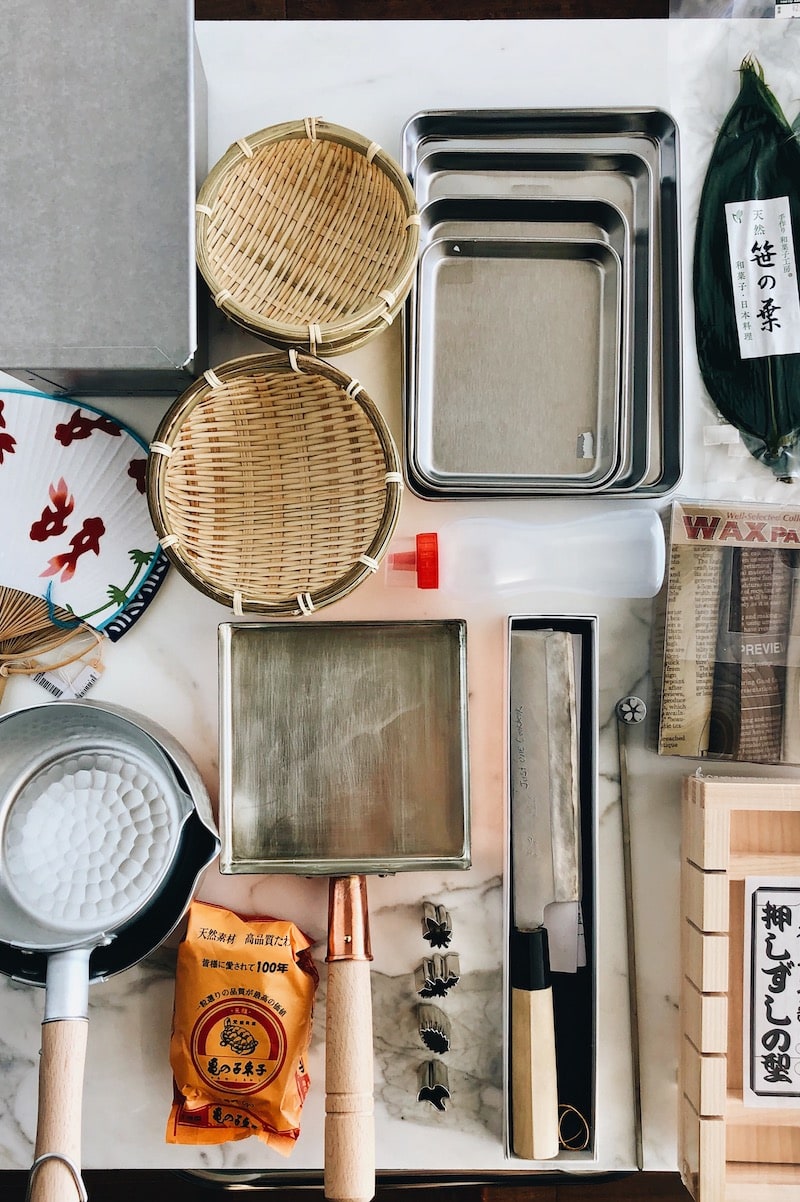
The picture below – Things I brought back in 2018: Mostly from my mom and grandma’s collections and a few gifts from my friends.
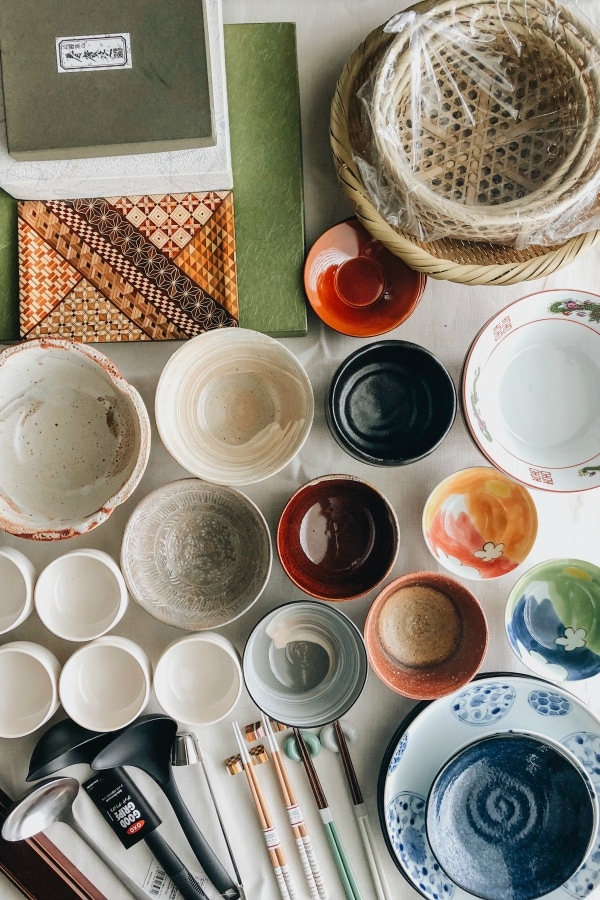
The picture below – Things I brought back in 2018: These are actually from Thailand – I brought them to Japan, and then brought them back to the US.
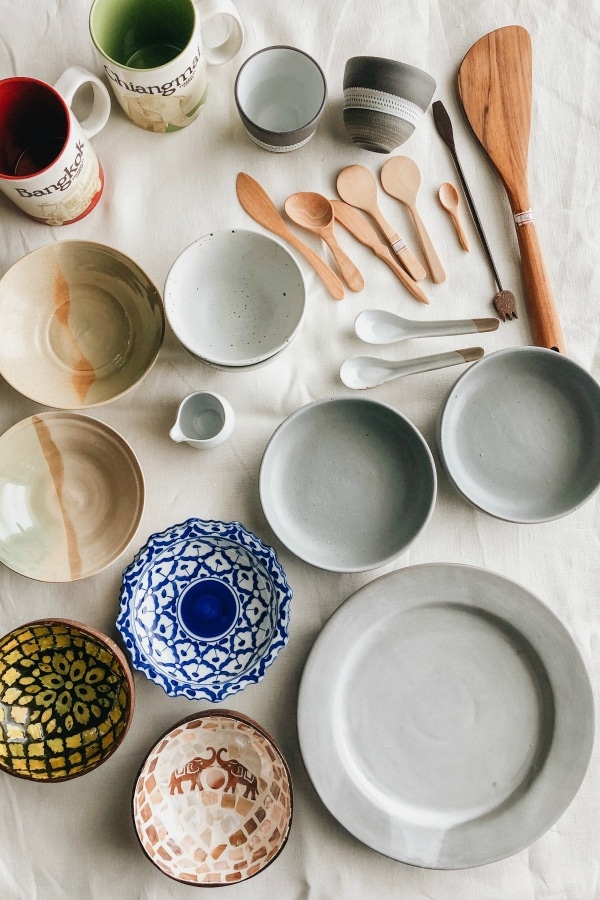
The picture below – Things I brought back in 2018: These white plates are all from Le Baise in Kappabashi Kitchen Town in Tokyo.
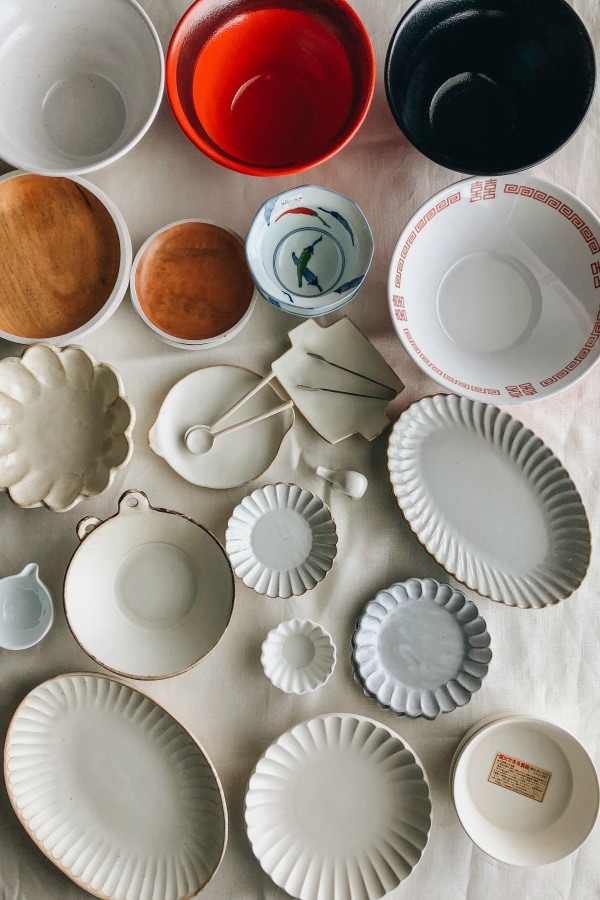
The picture below – Things I brought back in 2018: Unfortunately, this happened a few times, even though I had carefully wrapped them individually.
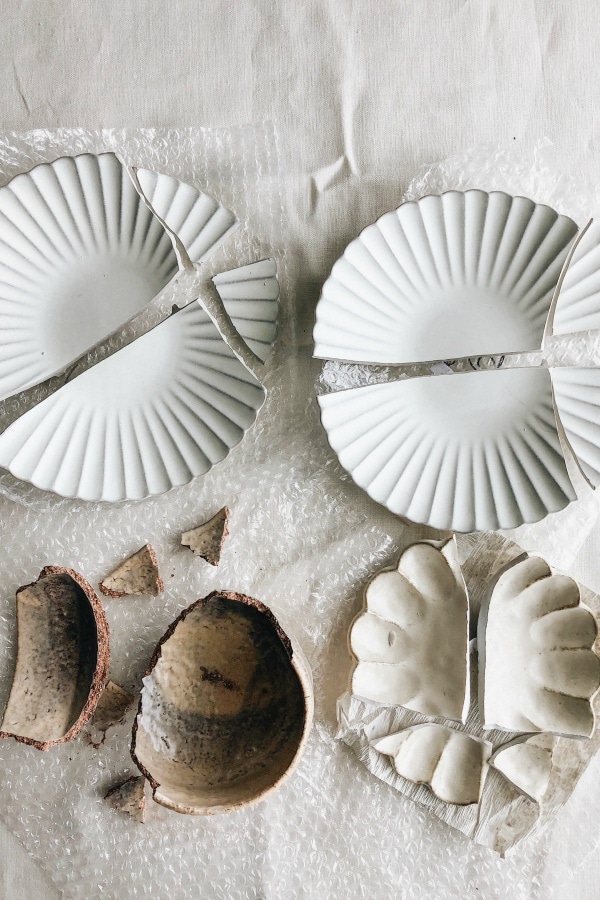
The picture below – Things I brought back in 2017: Ceramics from my trip to Bangkok on top and the rest are Japanese ceramics.
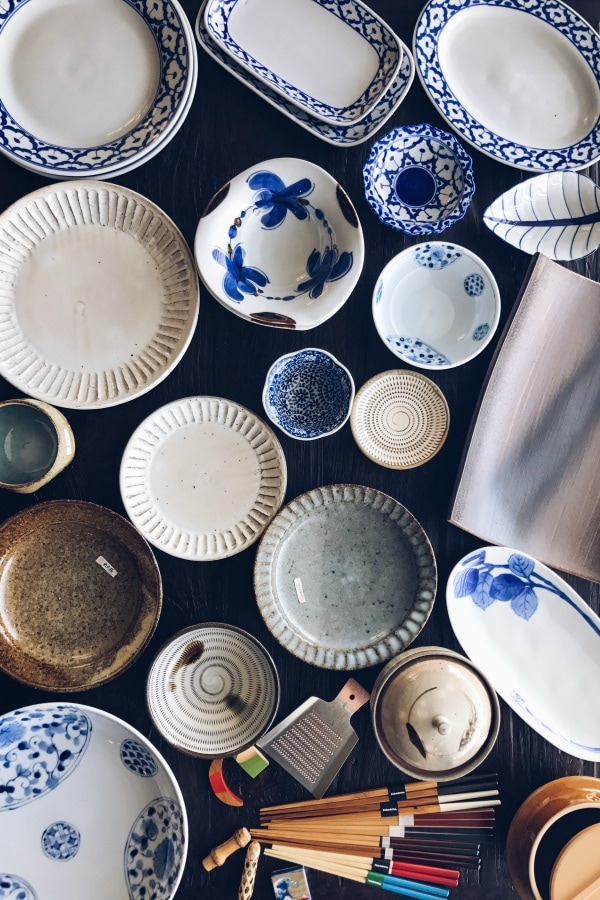
The picture below – Things I brought back in 2016: Majority of ceramics are from a department store Takashimaya in Yokohama. The rest are from my mom.
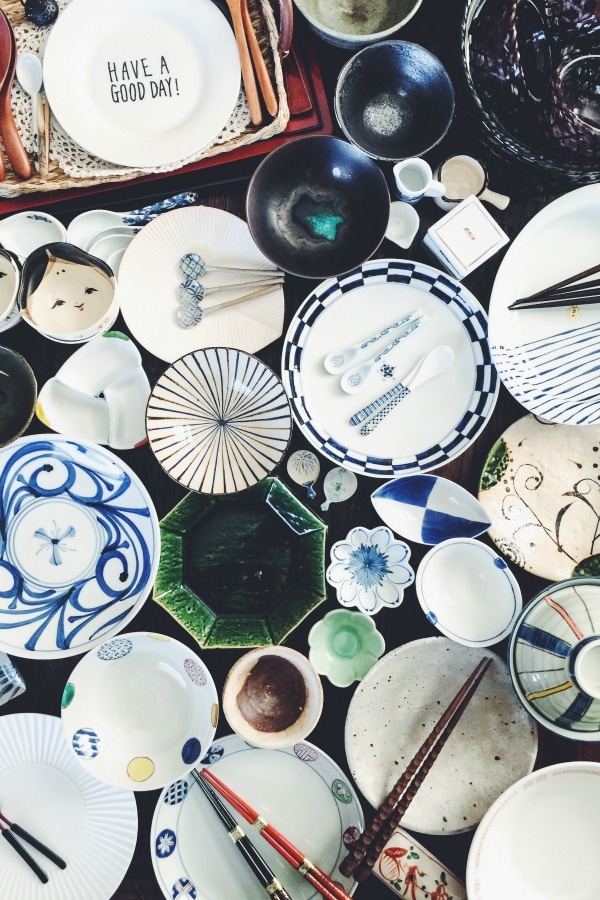
Where to Find Japanese Tableware in Tokyo Area?
The easiest place to find Japanese ceramics and kitchen items is to go to the kitchen floor (usually 7th or 8th floor) of the nearest department stores or Tokyu Hands. If you are looking for one of kind ceramics, there are some shops that sell unique ceramics made by artists. Here’s a small list of popular ceramic shops in Tokyo.
- Allegory Home Tools in Ebisunishi, Shibuya-ku
- Amahare in Shirokanedai, Minato-ku
- Aoba-do in Shirakawa, Koto-ku
- At Kiln Aoyama in Minami Aoyama, Minato-ku
- Beniya Mingeiten in Komaba, Meguro-ku
- Bloom & Branch in Minami Aoyama, Minato-ku
- Bondo in Kichijoji Hon-cho, Musashino-shi
- Casica in Shinkiba, Koto-ku
- Chidori in Misaki-cho, Chiyoda-ku
- CLASKA Gallery & Shop “DO” in Chuo-cho, Meguro-ku
- Dengama in Nishi Asakusa, Taito-ku
- FALL in Nishiogikita, Suginami-ku
- Fragile in Ginza, Chuo-ku
- Gyokusendo in Minami Aoyama, Minato-ku
- Japanese Pottery shop (Aritayaki Yakimono Ichiba) in Hiroo, Shibuya-ku
- Jokogumo in Shirogane-cho, Shinjuku-ku
- Kagure Omotesando in Jingumae, Shibuya-ku
- Kahahori in Kichijoji Minami-cho, Musashino-shi
- Kakesu Zakkaten in Kappabashi Kitchen Town, Asakusa, Taito-ku
- Kappabashi Kitchen Street in Asakusa, Taito-ku
- KnulpAA Gallery in Shakujiimachi, Nerima-ku
- Koharuan in Yarai-cho, Shinjuku-ku
- Kohoro in Tamagawa, Setagaya-ku
- La Ronde d’Argile in Wakamiya-cho, Shinjuku-ku
- Lion Pottery in Chuo-cho, Meguro-ku
- MARKUS in Kichijoji Honcho, Musashino-shi
- Migo Labo in Gohongi, Meguro-ku
- Migratory in Kamimeguro, Meguro-ku
- Mist∞ in Kichijoji Kitamachi, Musashino-shi
- Monsen in Tamagawa, Setagaya-ku
- Outbound in Kichijoji Honcho, Musashino-shi
- Pond Gallery in Kamimeguro, Meguro-ku
- POTPURRI in Shirakawa, Koto-ku
- Proto Tablewares and Precious in Kuramae, Taito-ku
- Roundabout in Uehara, Shibuya-ku
- Rozan in Nishiogikita, Suginami-ku
- Shouan Bunko in Shouan, Suginami-ku
- SML in Aobadai, Meguro-ku
- Sonomono in Nagasaki, Toshima-ku
- Sora in Himonya, Meguro-ku
- Spiral Market in Minami Aoyama, Minato-ku
- Style Hug in Yoyogi, Shibuya-ku
- Syuro in Torigoe, Taito-ku
- Takahashi Sohonten in Kappabashi Kitchen Town, Asakusa, Taito-ku
- Takumi in Ginza, Chuo-ku
- Tasogare-do in Nezu, Bunkyo-ku
- Tenoha in Daikanyama-cho, Shibuya-ku
- Teshigoto in Todoroki, Setagaya-ku
- Touan Yabukita in Kappabashi Kitchen Town, Asakusa, Taito-ku
- Utsuwa Aoba-do in Minami Aoyama, Minato-ku
- Utsuwa Daifuku in Minami Aoyama, Minato-ku
- Utsuwa Dokoro Kurumi in Kamiogi, Suginami-ku
- Utsuwa Kaede in Minami Aoyama, Minato-ku
- Utsuwa Kenshin in Shibuya, Shibuya-ku
- Utsuwa Shizen in Jingumae, Shibuya-ku
- Utsuwa Party in Komaba, Meguro-ku
- Vada Antiques in Kichijoji Hon-cho, Musashino-shi
- Wise Wise Tools in Akasaka, Minato-ku
- Yuyujin in Takaban, Meguro-ku
- Zakka Tsuchi no Kioku in Asagaya Minami, Suginami-ku
Japanese Online Shop
- Japanese Pottery Shop (ships internationally)
- Monsen
- Tojian
- Tableware East
- Uchill
- Utsuwaya Nishiyama
Have you brought back anything for your kitchen while visiting Japan? What are your favorites? Comment below and share your stories with us!
Sign up for the free Just One Cookbook newsletter delivered to your inbox! And stay in touch with me on Facebook, Pinterest, YouTube, and Instagram for all the latest updates.
Editor’s Note: This post was originally published on September 9, 2018. The content has been updated in September 2019.